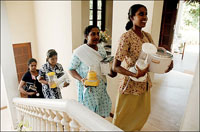Lebanese family enslaves Sri Lankan maid
Chandra, a female native of Sri Lanka, worked 16 hours a day seven days a week for a Lebanese family. The woman was doing the tasks of cooking, cleaning and running the household. The only time Chandra could leave was to throw out the garbage. Afterwards, she found the key to the closet, where her employers had hidden her passport.

"One day, while madam was on the telephone, I opened the front door and just left. Sleeping on the street was better than being in that prison," the 27-year-old told The Associated Press, giving only her first name for fear of retribution.
Chandra is one of thousands of foreign domestic workers in the Arab world who face abuse at the hands of employers, human rights groups say.
Long considered an issue in the oil-rich Gulf countries, the abuse of foreign housemaids has begun also gaining scrutiny in Lebanon, where there are an estimated 150,000 foreign domestic workers, mostly from Sri Lanka, the Philippines and Ethiopia.
In a report released Wednesday, New York-based Human Rights Watch criticized several Gulf states and Lebanon for failing to curb the abuses and protect Sri Lankan migrant women workers, who number about 80,000 here.
Nadim Houry, Lebanon researcher at HRW, said the government here exposes foreign housemaids to abuse by refusing to guarantee them a weekly rest day, maximum daily work hours or freedom of movement.
Authorities "aren't investigating and prosecuting those who break the law," Houry said. And domestic workers who do lodge a complaint will often find themselves accused of theft or some other crime.
Maids are common in most homes in Lebanon, a country of 4 million people, and are often seen walking dogs, throwing out the garbage or tending to children at playgrounds. On Sundays, some churches hold special services for the workers.
But an alarming number face exploitation, rights groups say.
HRW said some housemaids work 16-21 hour days, seven days a week, without vacation or sick days - often for less than a third of a U.S. dollar an hour. Their wages are often withheld and their passports routinely confiscated.
In Lebanon, the issue rose to prominence during the 2006 Israel-Hezbollah war, when employers reportedly denied scores of workers the right to return home, even though their embassies had organized evacuations.
Some were even left to fend for themselves, under fire, while their employers fled.
"My employers said, 'If we are going to die, you are going to be with us,"' the HRW report quoted Upeksha R., a former domestic worker in Lebanon, as saying.
The Lebanese government did not comment on Wednesday's report. But Labor Minister Tarrad Hamadeh said the country's labor laws are outdated.
"You are facing a formidable mafia made up of employment agencies, some foreign embassies and our embassies abroad. ... The only way to fight this is through modernizing laws," said Hamadeh, who submitted his resignation last year for political reasons but still technically holds his post because the government has not accepted it.
One of the main causes of abuse is the "sponsorship arrangement" - common also across the Gulf - which makes an employer legally responsible for anything a migrant employee does.
Samir Yammine, the owner of an employment agency, said many Lebanese take away their maids' passports to protect themselves. "If she gets into trouble, the sponsor is held responsible," he said.
Cases of serious abuse often end up at Lebanon's Caritas Migrant Center, where the Roman Catholic group's safe house offers women medical, social and legal services until they can return home.
Director Najla Chahda says the group in the last three years has handled 414 cases of seriously abused domestic workers, including 41 cases of people deprived of food and 16 cases of forced prostitution. But she added: "Not all Lebanese treat their maids like slaves. Many are very happy here."
Chandra, the Sri Lankan who escaped her employers, says she is happy now, despite having lost all the money she had earned at her job in the past two years.
"I now work in a supermarket in the morning, and in homes in the afternoon. All the people are very nice," she said.
Subscribe to Pravda.Ru Telegram channel, Facebook, RSS!





